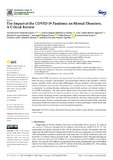Mostrar el registro sencillo del ítem
The impact of the covid-19 pandemic on mental disorders. A critical review
| dc.creator | Clemente Suárez, Vicente Javier | es_ES |
| dc.creator | Martínez-González, Marina Begoña | es_ES |
| dc.creator | Benítez Agudelo, Juan Camilo | es_ES |
| dc.creator | Navarro Jiménez, Eduardo | es_ES |
| dc.creator | Beltrán Velasco, Ana Isabel | es_ES |
| dc.creator | Ruisoto, Pablo | es_ES |
| dc.creator | Díaz Arroyo, Esperanza | es_ES |
| dc.creator | Laborde Cárdenas, Carmen Cecilia | es_ES |
| dc.creator | Tornero Aguilera, José Francisco | es_ES |
| dc.date.accessioned | 2022-01-18T09:18:39Z | |
| dc.date.available | 2022-01-18T09:18:39Z | |
| dc.date.issued | 2021 | |
| dc.identifier.issn | 1660-4601 | |
| dc.identifier.uri | https://hdl.handle.net/2454/41836 | |
| dc.description.abstract | The COVID-19 pandemic has impacted the lives of the worldwide population. Citizens suffer the social, economic, physiological, and psychological effects of this pandemic. Primary sources, scientific articles, and secondary bibliographic indexes, databases, and web pages were used for a consensus critical review. The method was a narrative review of the available literature to summarize the existing literature addressing mental health concerns and stressors related to the COVID-19 pandemic. The main search engines used in the present research were PubMed, SciELO, and Google Scholar. We found the pandemic has had a direct impact on psychopathologies such as anxiety, increasing its ratios, and depression. Other syndromes such as burnout and post-traumatic stress disorder have increased with the pandemic, showing a larger incidence among medical personnel. Moreover, eating disorders and violence have also increased. Public authorities must prepare healthcare systems for increasing incidences of mental pathologies. Mental health apps are one of the tools that can be used to reach the general population. | en |
| dc.format.extent | 25 p. | |
| dc.format.mimetype | application/pdf | en |
| dc.language.iso | eng | en |
| dc.publisher | MDPI | en |
| dc.relation.ispartof | International Journal of Environmental Research and Public Health 2021, 18, 10041 | en |
| dc.rights | © 2021 by the authors. Licensee MDPI, Basel, Switzerland. This article is an open access article distributed under the terms and conditions of the Creative Commons Attribution (CC BY) license. | en |
| dc.rights.uri | http://creativecommons.org/licenses/by/4.0/ | |
| dc.subject | Anxiety | en |
| dc.subject | Apps | en |
| dc.subject | Burnout | en |
| dc.subject | COVID-19 | en |
| dc.subject | Depression | en |
| dc.subject | Eating disorder | en |
| dc.subject | Post-traumatic stress disorder | en |
| dc.subject | Violence | en |
| dc.title | The impact of the covid-19 pandemic on mental disorders. A critical review | en |
| dc.type | info:eu-repo/semantics/article | en |
| dc.type | Artículo / Artikulua | es |
| dc.contributor.department | Ciencias de la Salud | es_ES |
| dc.contributor.department | Osasun Zientziak | eu |
| dc.rights.accessRights | info:eu-repo/semantics/openAccess | en |
| dc.rights.accessRights | Acceso abierto / Sarbide irekia | es |
| dc.identifier.doi | 10.3390/ijerph181910041 | |
| dc.relation.publisherversion | http://doi.org/10.3390/ijerph181910041 | |
| dc.type.version | info:eu-repo/semantics/publishedVersion | en |
| dc.type.version | Versión publicada / Argitaratu den bertsioa | es |



